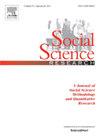男性和女性对女性养家糊口的厌恶:将个人态度与宏观背景联系起来
IF 3.5
2区 社会学
Q1 SOCIOLOGY
引用次数: 0
摘要
尽管全球范围内女性养家糊口(即妻子挣钱比丈夫多的婚姻)越来越普遍,但我们对个人对这种关系的态度的理解仍然有限。利用世界价值观调查的第七波,本研究考察了宏观层面的背景如何与男性和女性对女性养家糊口的厌恶相关。有四个主要发现。首先,平均而言,男性比女性更厌恶女性养家糊口。其次,在宏观层面性别平等程度较高的国家,男性和女性都不太反对女性养家糊口。第三,在男性失业率较高的国家,在厌恶女性养家糊口方面存在更大的性别差距。这一趋势主要是由这些国家的男性对女性养家糊口的高度厌恶所推动的,这表明男性可能会通过过度强调他们作为主要养家糊口者的角色来应对经济的不确定性,以增强他们濒临灭绝的男子气概。第四,在经济发展水平较高的国家,男性和女性都不太反对女性养家糊口,从而缩小了性别差距。这项研究强调了将个人对女性养家糊口的态度与宏观背景联系起来的重要性。本文章由计算机程序翻译,如有差异,请以英文原文为准。
Men’s and women’s aversion to female breadwinning: Linking individual attitudes to macro-level contexts
Despite the increased prevalence of female breadwinning (i.e., marriages in which the wife outearns her husband) across the globe, our understanding of individuals’ attitudes toward such relationships remains limited. Using the seventh wave of the World Values Survey, this study examines how macro-level contexts are related to men’s and women’s aversion to female breadwinning. There are four key findings. First, men, on average, exhibit a greater aversion to female breadwinning compared to women. Second, in countries with greater macro-level gender equality, both men and women are less averse to female breadwinning. Third, in countries with higher rates of men’s unemployment, there is a wider gender gap in aversion to female breadwinning. This trend is primarily driven by men’s heightened aversion to female breadwinning in such countries, which suggests men may respond to economic uncertainty by overemphasizing their roles as primary breadwinners to bolster their endangered masculinity. Fourth, in countries with higher levels of economic development, both men and women are less averse to female breadwinning, resulting in a narrower gender gap. This study highlights the importance of linking individual attitudes toward female breadwinning to macro-level contexts.
求助全文
通过发布文献求助,成功后即可免费获取论文全文。
去求助
来源期刊

Social Science Research
SOCIOLOGY-
CiteScore
4.30
自引率
4.00%
发文量
0
审稿时长
65 days
期刊介绍:
Social Science Research publishes papers devoted to quantitative social science research and methodology. The journal features articles that illustrate the use of quantitative methods in the empirical solution of substantive problems, and emphasizes those concerned with issues or methods that cut across traditional disciplinary lines. Special attention is given to methods that have been used by only one particular social science discipline, but that may have application to a broader range of areas.
 求助内容:
求助内容: 应助结果提醒方式:
应助结果提醒方式:


